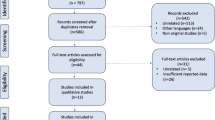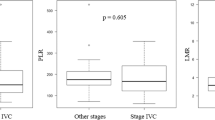Abstract
Background
The objective of this multicenter, retrospective cohort study was to evaluate the ability of inflammatory biomarkers representing the host immune system to predict outcomes in 70 patients with progressive radioactive iodine (RAI)-refractory thyroid cancer who were treated with sorafenib.
Method
Patients were divided into low and high inflammatory biomarker groups based on median values. Progression-free survival (PFS) and overall survival (OS) were assessed based on the lymphocyte-to-monocyte ratio (LMR), neutrophil-to-lymphocyte ratio (NLR), and platelet-to-lymphocyte ratio (PLR).
Results
The median LMR, NLR, and PLR values were 3.4, 2.2, and 140.1, respectively. No significant differences were observed in baseline characteristics of high and low LMR, NLR and PLR groups. Median PFS values were 6.6 and 19.5 months in the low and high LMR groups, respectively (P < 0.001). Compared with the high NLR and PLR groups, PFS was significantly prolonged in the low NLR and PLR groups (P = 0.003 and P = 0.041 respectively). In the multivariate analysis, low LMR and high NLR were associated with poor PFS after adjusting for multiple confounding factors including age, sex, pathology, disease-related symptoms, serum thyroglobulin level, lung-only metastasis, cumulative RAI dose, time from diagnosis, and longer diameter of the target lesion (hazard ratio, HR = 2.42; 95% confidence interval, CI 1.25–4.71; P = 0.009, and HR = 2.09; CI, 1.06–4.14; P = 0.033, respectively). High LMR, low NLR, and low PLR were significantly associated with prolonged OS (P = 0.011, P = 0.023, and P = 0.007, respectively). Patients with at least one risk factors for inflammatory biomarkers presented a significantly lower PFS (HR 2.29; CI, 1.36–3.84; P = 0.003) and OS (HR 2.95; CI, 1.49–5.81; P = 0.006) than patients without any risk factor.
Conclusion
Baseline inflammatory biomarkers successfully predicted PFS and OS in patients with progressive RAI-refractory thyroid cancer treated with sorafenib. These prognostic biomarkers might help arrive at appropriate clinical decisions regarding the use of sorafenib.



Similar content being viewed by others
References
S.I. Grivennikov, F.R. Greten, M. Karin, Immunity, inflammation, and cancer. Cell 140(6), 883–899 (2010)
J.D. French, K. Bible, C. Spitzweg, B.R. Haugen, M. Ryder, Leveraging the immune system to treat advanced thyroid cancers. Lancet Diabetes Endocrinol. 5(6), 469–481 (2017)
M.P. Pusztaszeri, W.C. Faquin, P.M. Sadow, Tumor-associated inflammatory cells in thyroid carcinomas. Surg. Pathol. Clin. 7(4), 501–514 (2014)
S. Gupta, A. Patel, A. Folstad, C. Fenton, C.A. Dinauer, R.M. Tuttle, R. Conran, G.L. Francis, Infiltration of differentiated thyroid carcinoma by proliferating lymphocytes is associated with improved disease-free survival for children and young adults. J. Clin. Endocrinol. Metab. 86(3), 1346–1354 (2001)
T. Chanmee, P. Ontong, K. Konno, N. Itano, Tumor-associated macrophages as major players in the tumor microenvironment. Cancers (Basel) 6(3), 1670–1690 (2014)
M. Ryder, R.A. Ghossein, J.C. Ricarte-Filho, J.A. Knauf, J.A. Fagin, Increased density of tumor-associated macrophages is associated with decreased survival in advanced thyroid cancer. Endocr. Relat. Cancer 15(4), 1069–1074 (2008)
W. Qing, W.Y. Fang, L. Ye, L.Y. Shen, X.F. Zhang, X.C. Fei, X. Chen, W.Q. Wang, X.Y. Li, J.C. Xiao, G. Ning, Density of tumor-associated macrophages correlates with lymph node metastasis in papillary thyroid carcinoma. Thyroid 22(9), 905–910 (2012)
J. Ahn, E. Song, H.S. Oh, D.E. Song, W.G. Kim, T.Y. Kim, W.B. Kim, Y.K. Shong, M.J. Jeon, Low lymphocyte-to-monocyte ratios are associated with poor overall survival in anaplastic thyroid carcinoma patients. Thyroid 29(6), 824–829 (2019)
C. Li, H. Zhang, S. Li, D. Zhang, J. Li, G. Dionigi, N. Liang, H. Sun, Prognostic impact of inflammatory markers PLR, LMR, PDW, MPV in medullary thyroid carcinoma. Front. Endocrinol. (Lausanne) 13, 861869 (2022)
J. Ahn, E. Song, W.G. Kim, T.Y. Kim, W.B. Kim, Y.K. Shong, M.J. Jeon, Prognostic role of the lymphocyte-to-monocyte ratio for clinical outcomes of patients with progressive radioiodine-refractory differentiated thyroid carcinoma treated by sorafenib. Clin. Endocrinol. (Oxf) 92(1), 71–76 (2020)
M.H. Taylor, S. Takahashi, J. Capdevila, M. Tahara, S. Leboulleux, N. Kiyota, C.E. Dutcus, R. Xie, B. Robinson, S. Sherman, M.A. Habra, R. Elisei, L.J. Wirth, Correlation of performance status and neutrophil-lymphocyte ratio with efficacy in radioiodine-refractory differentiated thyroid cancer treated with lenvatinib. Thyroid 31(8), 1226–1234 (2021)
H. Yamazaki, H. Iwasaki, N. Suganuma, S. Toda, K. Masudo, H. Nakayama, Y. Rino, M. Masuda, Inflammatory biomarkers and dynamics of neutrophil-to-lymphocyte ratio in lenvatinib treatment for anaplastic thyroid carcinoma. Gland Surg. 10(3), 852–860 (2021)
M. Kim, T.H. Kim, D.Y. Shin, D.J. Lim, E.Y. Kim, W.B. Kim, J.H. Chung, Y.K. Shong, B.H. Kim, W.G. Kim, Tertiary care experience of sorafenib in the treatment of progressive radioiodine-refractory differentiated thyroid carcinoma: A Korean multicenter study. Thyroid 28(3), 340–348 (2018)
C. Spitzweg, K.C. Bible, L.C. Hofbauer, J.C. Morris, Advanced radioiodine-refractory differentiated thyroid cancer: The sodium iodide symporter and other emerging therapeutic targets. Lancet Diabetes Endocrinol. 2(10), 830–842 (2014)
B.R. Haugen, E.K. Alexander, K.C. Bible, G.M. Doherty, S.J. Mandel, Y.E. Nikiforov, F. Pacini, G.W. Randolph, A.M. Sawka, M. Schlumberger, K.G. Schuff, S.I. Sherman, J.A. Sosa, D.L. Steward, R.M. Tuttle, L. Wartofsky, 2015 American thyroid association management guidelines for adult patients with thyroid nodules and differentiated thyroid cancer: The American thyroid association guidelines task force on thyroid nodules and differentiated thyroid cancer. Thyroid 26(1), 1–133 (2016)
C. Durante, N. Haddy, E. Baudin, S. Leboulleux, D. Hartl, J.P. Travagli, B. Caillou, M. Ricard, J.D. Lumbroso, F. De Vathaire, M. Schlumberger, Long-term outcome of 444 patients with distant metastases from papillary and follicular thyroid carcinoma: Benefits and limits of radioiodine therapy. J. Clin. Endocrinol. Metab. 91(8), 2892–2899 (2006)
L. Giovanella, L. Scappaticcio, Radioiodine therapy of advanced differentiated thyroid cancer: clinical considerations and multidisciplinary approach. Q. J. Nucl. Med. Mol. Imaging 63(3), 229–234 (2019)
S.M. Wilhelm, L. Adnane, P. Newell, A. Villanueva, J.M. Llovet, M. Lynch, Preclinical overview of sorafenib, a multikinase inhibitor that targets both Raf and VEGF and PDGF receptor tyrosine kinase signaling. Mol. Cancer Ther. 7(10), 3129–3140 (2008)
M.S. Brose, C.M. Nutting, B. Jarzab, R. Elisei, S. Siena, L. Bastholt, C. de la Fouchardiere, F. Pacini, R. Paschke, Y.K. Shong, S.I. Sherman, J.W. Smit, J. Chung, C. Kappeler, C. Peña, I. Molnár, M.J. Schlumberger, Sorafenib in radioactive iodine-refractory, locally advanced or metastatic differentiated thyroid cancer: A randomised, double-blind, phase 3 trial. Lancet 384(9940), 319–328 (2014)
H.S. Oh, D.Y. Shin, M. Kim, S.Y. Park, T.H. Kim, B.H. Kim, E.Y. Kim, W.B. Kim, J.H. Chung, Y.K. Shong, D.J. Lim, W.G. Kim, Extended real-world observation of patients treated with sorafenib for radioactive iodine-refractory differentiated thyroid carcinoma and impact of lenvatinib salvage treatment: A Korean multicenter study. Thyroid 29(12), 1804–1810 (2019)
T. Feola, A. Cozzolino, R. Centello, C. Pandozzi, M.G. Tarsitano, E. Giannetta, Predictors of response and survival to multikinase inhibitors in radioiodine resistant differentiated thyroid cancer. J. Pers. Med. 11(7), 674 (2021)
S. Matsubayashi, K. Kawai, Y. Matsumoto, T. Mukuta, T. Morita, K. Hirai, F. Matsuzuka, K. Kakudoh, K. Kuma, H. Tamai, The correlation between papillary thyroid carcinoma and lymphocytic infiltration in the thyroid gland. J. Clin. Endocrinol. Metab. 80(12), 3421–3424 (1995)
E. Song, M.J. Jeon, S. Park, M. Kim, H.S. Oh, D.E. Song, W.G. Kim, W.B. Kim, Y.K. Shong, T.Y. Kim, Influence of coexistent Hashimoto’s thyroiditis on the extent of cervical lymph node dissection and prognosis in papillary thyroid carcinoma. Clin. Endocrinol. (Oxf) 88(1), 123–128 (2018)
F. Lee, P.S. Yang, M.N. Chien, J.J. Lee, C.H. Leung, S.P. Cheng, An increased neutrophil-to-lymphocyte ratio predicts incomplete response to therapy in differentiated thyroid cancer. Int. J. Med. Sci. 15(14), 1757–1763 (2018)
A.J. Templeton, M.G. McNamara, B. Šeruga, F.E. Vera-Badillo, P. Aneja, A. Ocaña, R. Leibowitz-Amit, G. Sonpavde, J.J. Knox, B. Tran, I.F. Tannock, E. Amir, Prognostic role of neutrophil-to-lymphocyte ratio in solid tumors: A systematic review and meta-analysis. J. Natl. Cancer Inst. 106(6), dju124 (2014)
G. Qiang, C. Liang, F. Xiao, Q. Yu, H. Wen, Z. Song, Y. Tian, B. Shi, Y. Guo, D. Liu, Prognostic significance of platelet-to-lymphocyte ratio in non-small-cell lung cancer: A meta-analysis. Onco. Targets Ther. 9, 869–876 (2016)
H. Yodying, A. Matsuda, M. Miyashita, S. Matsumoto, N. Sakurazawa, M. Yamada, E. Uchida, Prognostic significance of neutrophil-to-lymphocyte ratio and platelet-to-lymphocyte ratio in oncologic outcomes of esophageal cancer: A systematic review and meta-analysis. Ann. Surg. Oncol. 23(2), 646–654 (2016)
B. Li, P. Zhou, Y. Liu, H. Wei, X. Yang, T. Chen, J. Xiao, Platelet-to-lymphocyte ratio in advanced Cancer: Review and meta-analysis. Clin. Chim. Acta. 483, 48–56 (2018)
Acknowledgements
A part of this study was presented as poster at the 10th Seoul International Congress of Endocrinology and Metabolism, 2022.
Author contributions
Conception, design, review, and editing were performed by D.J.L. and W.G.K.; Data collection and curation were performed by M.J.J., E.Y.K., D.Y.S., B.H.K., W.B.K., and Y.K.S.; Analysis and the first draft of the manuscript was written by M.J. and M.K.; All authors read and approved the final manuscript.
Funding
This study was supported by clinical research grant from Pusan National University Hospital in 2022 and a grant (2022IP0011) from the Asan Institute for Life Sciences, Asan Medical Center, Seoul, Korea.
Author information
Authors and Affiliations
Corresponding authors
Ethics declarations
Conflict of interest
Author W.B.K., Y.K.S., and W.G.K. were advisory board members of Bayer, Eisai, Lilly, and Hanmi Pharmaceuticals. Otherwise, there are no competing financial interests that exist.
Ethical approval
The study protocol was approved by the Institutional Review Board of each participating institution. The study was conducted in accordance with the provisions of the Declaration of Helsinki.
Additional information
Publisher’s note Springer Nature remains neutral with regard to jurisdictional claims in published maps and institutional affiliations.
Rights and permissions
Springer Nature or its licensor (e.g. a society or other partner) holds exclusive rights to this article under a publishing agreement with the author(s) or other rightsholder(s); author self-archiving of the accepted manuscript version of this article is solely governed by the terms of such publishing agreement and applicable law.
About this article
Cite this article
Jin, M., Kim, M., Jeon, M.J. et al. Inflammatory biomarkers predict outcomes of patients with radioactive iodine refractory thyroid cancer treated with sorafenib. Endocrine 81, 298–305 (2023). https://doi.org/10.1007/s12020-023-03348-0
Received:
Accepted:
Published:
Issue Date:
DOI: https://doi.org/10.1007/s12020-023-03348-0




